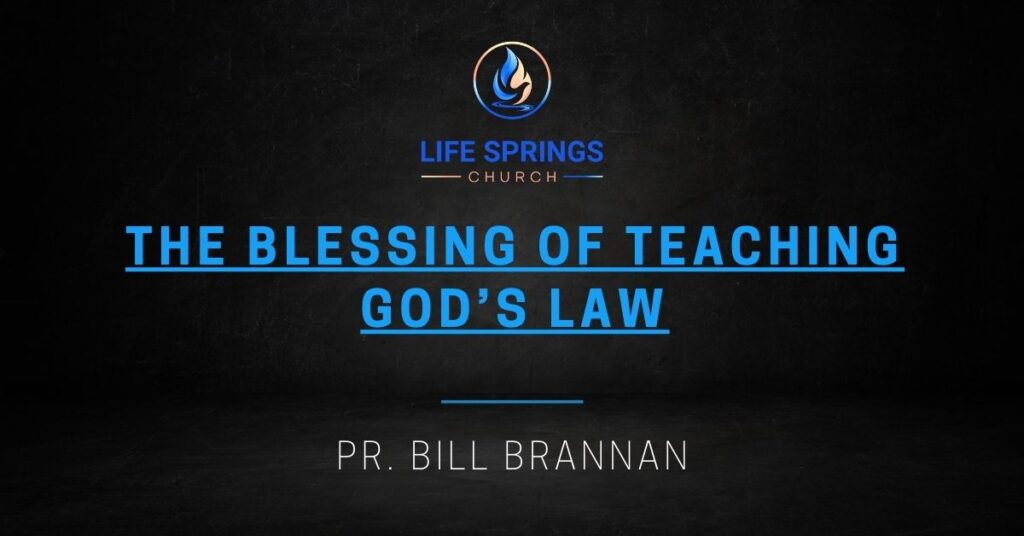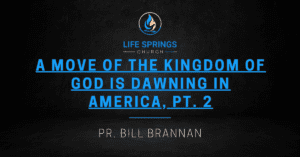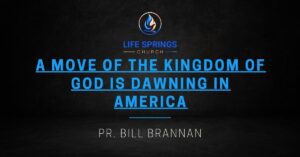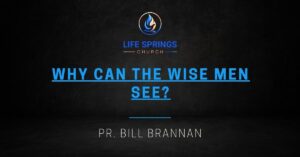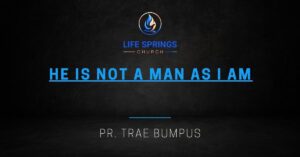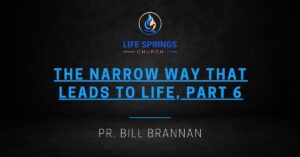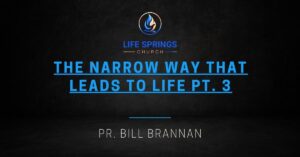Understanding the Blessing of God’s Law: A Transformative Journey

In this enlightening sermon, Pastor Bill Brannan unpacks the often misunderstood role of God’s law in our lives and how it can lead us to a deeper relationship with Christ. He challenges common misconceptions and reveals the transformative power of understanding God’s law, encouraging believers to embrace it as a guide to living a life of purpose and love.
Teaching God’s Law, Blessings
God’s law is often seen as a burden, but it is, in fact, a profound blessing. It provides a framework for living that aligns with divine principles. By teaching God’s law, we open pathways to understanding His character and intentions for humanity.
When we embrace God’s law, we find that it leads to blessings both spiritually and materially. The law serves as a guide, illuminating the path to righteousness. It encourages us to engage in behaviors that foster community, love, and justice.

Photo by Nathan Anderson on Unsplash
Furthermore, understanding God’s law helps to cultivate a sense of belonging within the community of believers. It fosters connections based on shared values and principles, creating a robust support system that encourages personal and communal growth.
Understanding the Prosperity Gospel
The Prosperity Gospel often presents a distorted view of God’s blessings. It suggests that financial success and physical well-being are guaranteed for those who have faith. However, this interpretation can lead to disillusionment when expectations are not met.
True understanding of God’s blessings goes beyond material wealth. It encompasses spiritual growth, emotional resilience, and a deep relationship with Christ. The Prosperity Gospel can distract believers from the true essence of faith, which is about transformation and character development.

Photo by Nick Fewings on Unsplash
By focusing solely on material gains, adherents may miss the profound blessings that come from living a life aligned with God’s law. This misalignment can lead to a shallow faith that lacks the depth required for true discipleship.
The Law as a Schoolmaster, Education
The concept of the law as a schoolmaster is crucial for understanding its role in our spiritual education. It is designed to guide us toward Christ, revealing our need for grace and redemption. Instead of instilling guilt, the law should inspire a desire for growth and understanding.
Education through God’s law teaches us about justice, mercy, and love. It encourages us to reflect on our actions and their impact on others. This introspection is essential for personal growth and the development of a Christ-like character.

Photo by Kimberly Farmer on Unsplash
As we study and apply God’s law, we become equipped to live out our faith in practical ways. This education fosters a deeper understanding of God’s will and invites us to participate actively in His kingdom on Earth.
Guilt Tripping, Emotional Manipulation
Using guilt as a tool for manipulation is prevalent in many religious circles. This approach can create a toxic environment where individuals feel condemned rather than uplifted. It’s essential to recognize that God’s intention is not to shame but to guide us toward a better path.
Emotional manipulation can lead to a distorted view of God’s law. Instead of seeing it as a guide to righteousness, individuals may perceive it as a set of burdensome rules meant to punish. This perspective can hinder spiritual growth and lead to resentment.

Photo by Isabella Fischer on Unsplash
True teaching of God’s law should be rooted in love and grace. It should inspire hope and transformation rather than fear and guilt. By focusing on the positive aspects of God’s law, we can encourage others to embrace it as a source of strength and guidance.
The Law is Torah, Biblical Teachings
The term “Torah” encompasses more than just rules; it represents divine instruction. It includes teachings that promote justice, compassion, and community well-being. Understanding the law as Torah invites us to explore its rich, multifaceted nature.
These biblical teachings are not merely historical; they are relevant and applicable to our lives today. They guide our moral compass and challenge us to live in ways that reflect God’s character. Embracing the Torah can lead to profound spiritual growth and a deeper connection with God.

Photo by Tanner Mardis on Unsplash
Moreover, the Torah emphasizes the importance of relationships—both with God and with others. It encourages us to live in harmony, fostering communities that reflect divine love and justice.
The Law in Creation, Divine Design
The law is intricately woven into the fabric of creation. It reflects God’s design for the universe and humanity. By observing the natural order, we can gain insights into the principles that govern both the physical and spiritual realms.
Understanding the law as part of divine design helps us appreciate the beauty and order in creation. It invites us to live in harmony with the world around us, aligning our lives with God’s intentions. This alignment leads to fulfillment and joy.
When we recognize the law in creation, we see how it guides us toward flourishing. It teaches us about balance, stewardship, and responsibility—values that are essential for a thriving life.
The Law, Principles of Justice
The law embodies principles of justice that are foundational to a fair society. It promotes equity and accountability, ensuring that individuals are treated with dignity and respect. These principles are essential for fostering peace and harmony within communities.
By upholding the law, we advocate for justice on behalf of the marginalized and oppressed. This advocacy reflects God’s heart for humanity, calling us to be agents of change in a broken world. When we embrace these principles, we contribute to a more just and compassionate society.

Photo by Mika Baumeister on Unsplash
Moreover, the law challenges us to examine our own hearts and actions. It encourages us to pursue justice not only in our communities but also within ourselves. This introspection leads to personal growth and a commitment to embodying justice in all aspects of life.
The Law of Sin and Death, Spiritual Consequences
The law of sin and death highlights the spiritual consequences of living contrary to God’s commandments. It serves as a reminder that disobedience leads to separation from God and ultimately results in spiritual death. Understanding this law is crucial for grasping the need for redemption through Christ.
However, this does not mean that we are condemned to a life of guilt. Instead, it emphasizes the importance of grace and forgiveness offered through Jesus. Recognizing the law of sin and death helps us appreciate the transformative power of the Gospel.

Photo by Ashley Batz on Unsplash
By acknowledging the reality of sin and its consequences, we are compelled to seek a deeper relationship with Christ. This relationship provides the strength needed to overcome sin and live in accordance with God’s will, leading to spiritual life and renewal.
The Law of the Spirit of Life, Freedom in Christ
The Law of the Spirit of Life is a profound truth that encapsulates the freedom we have in Christ. This freedom is not merely the absence of restrictions but the empowerment to live in accordance with God’s will. Through the Holy Spirit, we receive the strength to overcome sin and to embody love and grace in our daily lives.
In Romans 8:2, we learn that the law of the Spirit of life has set us free from the law of sin and death. This liberation allows us to pursue righteousness without the weight of guilt and condemnation. It’s an invitation to walk in the fullness of life that Christ offers.

Photo by Joshua Earle on Unsplash
Understanding this law means recognizing that our relationship with God is rooted in love rather than obligation. This shift in perspective transforms how we view the law; it becomes a pathway to freedom rather than a set of burdensome rules. As we embrace this truth, we discover the joy of living in alignment with God’s purpose.
Handling Misinformation, Critical Thinking
In today’s world, misinformation is rampant, challenging our ability to discern truth. As believers, we are called to navigate this landscape with wisdom and critical thinking. It is essential to evaluate the sources of information we encounter and discern whether they promote love, compassion, and understanding or sow fear and division.
Critical thinking involves questioning the motivations behind the information we receive. Does it encourage unity or foster discord? By applying the principles of God’s law, we can develop a framework for evaluating information that aligns with virtue and wisdom.

Photo by Clark Tibbs on Unsplash
Moreover, fostering conversations around differing perspectives can bridge divides. Finding common ground on issues such as justice and compassion allows us to engage with others meaningfully. By doing so, we reflect Christ’s love and grace in a fractured world.
Virtue and Wisdom, Beyond Facts
The pursuit of virtue and wisdom transcends mere facts. It challenges us to cultivate a mindset that seeks goodness, justice, and truth. Virtue involves aligning our actions with the values of the Kingdom of God, while wisdom helps us navigate complex situations with grace and discernment.
In a society inundated with information, the ability to discern what is virtuous and wise becomes crucial. We must ask ourselves whether our beliefs and actions contribute to a culture of love and understanding or perpetuate conflict and division.

Photo by Ashes Sitoula on Unsplash
By prioritizing virtue and wisdom, we can create spaces where dialogue flourishes. Encouraging others to engage in critical thought allows us to collectively pursue a vision of a community rooted in God’s love. This approach fosters a culture of respect and empathy, essential for healing our world.
The Law and Fear, Overcoming Anxiety
Fear often clouds our judgment and hinders our ability to act in love. The law provides a foundation for overcoming anxiety by reminding us of God’s unwavering presence and guidance. When we understand the law as a reflection of God’s character, we can confront our fears with confidence.
In 1 John 4:18, we find that perfect love casts out fear. Embracing God’s love through His law empowers us to face challenges without succumbing to anxiety. This transformation allows us to respond to life’s uncertainties with courage and grace.

Photo by Simon Hurry on Unsplash
By anchoring ourselves in the truth of God’s law, we learn to navigate fear with faith. This shift in perspective enables us to become conduits of peace and hope for those around us, fostering a community where love prevails over fear.
The Law and the Gospel, Salvation Message
The relationship between the law and the gospel is foundational to understanding salvation. The law reveals our need for redemption, while the gospel provides the means to achieve it. Through Christ’s sacrifice, we are offered forgiveness and the opportunity to live in accordance with God’s will.
In Galatians 2:16, we learn that we are justified by faith in Christ, not by the works of the law. This truth underscores the importance of recognizing that while the law guides us toward righteousness, it is only through the gospel that we find true salvation.

Photo by Olga DeLawrence on Unsplash
As we embrace the gospel, we are transformed from within, enabling us to fulfill the law’s requirements out of love rather than obligation. This transformation leads to a life marked by grace, mercy, and a desire to share the good news with others.
The Law and the World, Cultural Impact
The law’s principles have a profound impact on culture and society. By aligning our lives with God’s law, we contribute to building a world that reflects His justice and mercy. This alignment fosters a culture where love and compassion thrive, encouraging others to seek the truth of the gospel.
As Christians, we are called to engage with the world around us, advocating for justice and righteousness. Our actions should reflect the values of the Kingdom, demonstrating the transformative power of God’s law in practical ways.

Photo by Iñaki del Olmo on Unsplash
Moreover, by embodying the principles of God’s law, we can influence cultural narratives. We must strive to be voices of hope and change, challenging societal norms that contradict God’s design for humanity. This engagement invites others to explore the beauty of a life lived in accordance with divine principles.
Closing Prayer, Spiritual Reflection
As we conclude this journey through understanding God’s law, let us take a moment for spiritual reflection. We invite God to open our hearts and minds, allowing His truth to penetrate our lives.
Heavenly Father, we thank You for the gift of Your law, which guides us toward righteousness. Help us to embrace the freedom found in Christ, empowering us to live lives marked by love and grace. May we seek wisdom and virtue in all we do, navigating the complexities of this world with Your light.

Photo by Samuel Austin on Unsplash
As we move forward, let us be ambassadors of Your kingdom, sharing the good news of the gospel with those around us. May our lives reflect Your love, drawing others to the hope and salvation found in You. In Jesus’ name, we pray, Amen.
The Blessing of Teaching God’s Law
(Preaching Outline)
1) At our book club on Tuesday we discussed the fact that many people in South America are coming to Christ. I asked Chuck if he knew if they were primarily brought into liberation theology and he told me that they were actually emphasizing the prosperity gospel.
a) The point is that all of those numbers account for little with regard to God’s Kingdom coming and His will being done on earth as it is in heaven because of ideas that make them irrelevant to discipling nations.
b) The prosperity gospel is the wrong kingdom.
c) Immature Christianity can be well intentioned but still be building the wrong kingdom.
d) Christians often rejoice to hear many people were baptized, but we need to ask, baptized into what? (The images of baptism).
e) There are many ideas in the church that keep Christians from transforming the world.
f) Today I want to begin by exploring one idea that I am convinced has the potential to transform the world…it is our approach to God’s law.
2) The school-master
a) Galatians 3:24 (NKJV) — 24 Therefore the law was our (school-master AV) tutor to bring us to Christ, that we might be justified by faith.
b) Traditional approach
c) Suggested approach
d) The Law is stamped on creation: Romans 2:12–15 (NKJV) — 12 For as many as have sinned without law will also perish without law, and as many as have sinned in the law will be judged by the law 13 (for not the hearers of the law are just in the sight of God, but the doers of the law will be justified; 14 for when Gentiles, who do not have the law, by nature do the things in the law, these, although not having the law, are a law to themselves, 15 who show the work of the law written in their hearts, their conscience also bearing witness, and between themselves their thoughts accusing or else excusing them)
3) The law in the book of Romans:
a) Romans 7:14–23 (NKJV) — 14 For we know that the law is spiritual, but I am carnal, sold under sin. 15 For what I am doing, I do not understand. For what I will to do, that I do not practice; but what I hate, that I do. 16 If, then, I do what I will not to do, I agree with the law that it is good. 17 But now, it is no longer I who do it, but sin that dwells in me. 18 For I know that in me (that is, in my flesh) nothing good dwells; for to will is present with me, but how to perform what is good I do not find. 19 For the good that I will to do, I do not do; but the evil I will not to do, that I practice. 20 Now if I do what I will not to do, it is no longer I who do it, but sin that dwells in me. 21 I find then a law, that evil is present with me, the one who wills to do good. 22 For I delight in the law of God according to the inward man. 23 But I see another law in my members, warring against the law of my mind, and bringing me into captivity to the law of sin which is in my members.
b) Romans 5:12–15 (NKJV) — 12 Therefore, just as through one man sin entered the world, and death through sin, and thus death spread to all men, because all sinned—13 (For until the law sin was in the world, but sin is not imputed when there is no law. 14 Nevertheless death reigned from Adam to Moses, even over those who had not sinned according to the likeness of the transgression of Adam, who is a type of Him who was to come. 15 But the free gift is not like the offense. For if by the one man’s offense many died, much more the grace of God and the gift by the grace of the one Man, Jesus Christ, abounded to many.
c) Romans 8:2–4 (NKJV) — 2 For the law of the Spirit of life in Christ Jesus has made me free from the law of sin and death. 3 For what the law could not do in that it was weak through the flesh, God did by sending His own Son in the likeness of sinful flesh, on account of sin: He condemned sin in the flesh, 4 that the righteous requirement of the law might be fulfilled in us who do not walk according to the flesh but according to the Spirit.
d) Matthew 5:6 (NKJV) — 6 Blessed are those who hunger and thirst for righteousness, For they shall be filled.
e) Putting the power of God to work for a purpose!
i) Like the potential of a car in a driveway.
4) Why was the law given?
a) Galatians 3:19 (NKJV) — 19 What purpose then does the law serve? It was added because of transgressions, till the Seed should come to whom the promise was made; and it was appointed through angels by the hand of a mediator.
b) The fact that God gave the law before the gospel.
c) Given because of transgression.
d) The law of God and the state.
e) The law of God and the Levitical Priesthood: Hebrews 10:1–2 (NKJV) — 1 For the law, having a shadow of the good things to come, and not the very image of the things, can never with these same sacrifices, which they offer continually year by year, make those who approach perfect. 2 For then would they not have ceased to be offered? For the worshipers, once purified, would have had no more consciousness of sins.
5) A current example of the potential for teaching the law.
a) How do we handle the issue of misinformation? – Trust – Freedom – An incredible opportunity to apply the law as a tutor.
b) Fear, anger, hatred, frustration vs. love, mercy, grace, compassion and hope.
c) What are the motivational mechanisms being used and what kingdom do they build?
d) It is ultimately about a vision of what kind of people we want to be and what kind of world we want to create.
e) The clearer that vision, the more it activates our lives through study, prayer and action.
6) The blessing of teaching God’s law.
a) We need to get people to agree with the law in their mind.
b) Plato – well-ordered soul and well-ordered society. – interconnected
c) The law of God includes wisdom to help us well order society which helps people to agree with the law in their mind.
d) The more complete and accurate our ability to teach the Law, like Jesus did, the more it awakens conscience when we find we are enemies of the world we want to create and the people we want to be.
e) It is about restoring the type of Christianity that blesses and transforms the world.
f) The law is a tutor that brings us to Christ – conversion based on wanting to be like Jesus and to see God’s kingdom come and His will be done on earth as it is in heaven.

